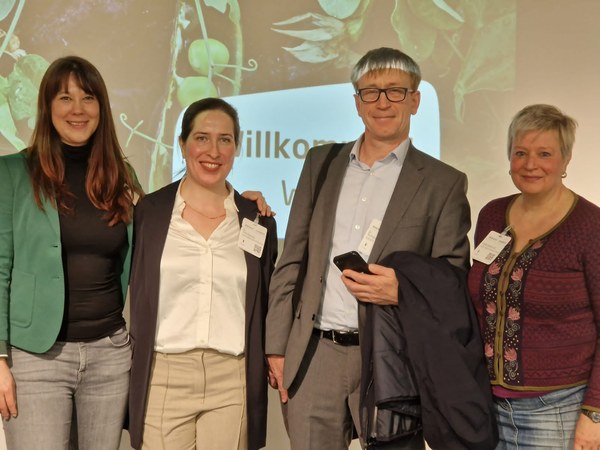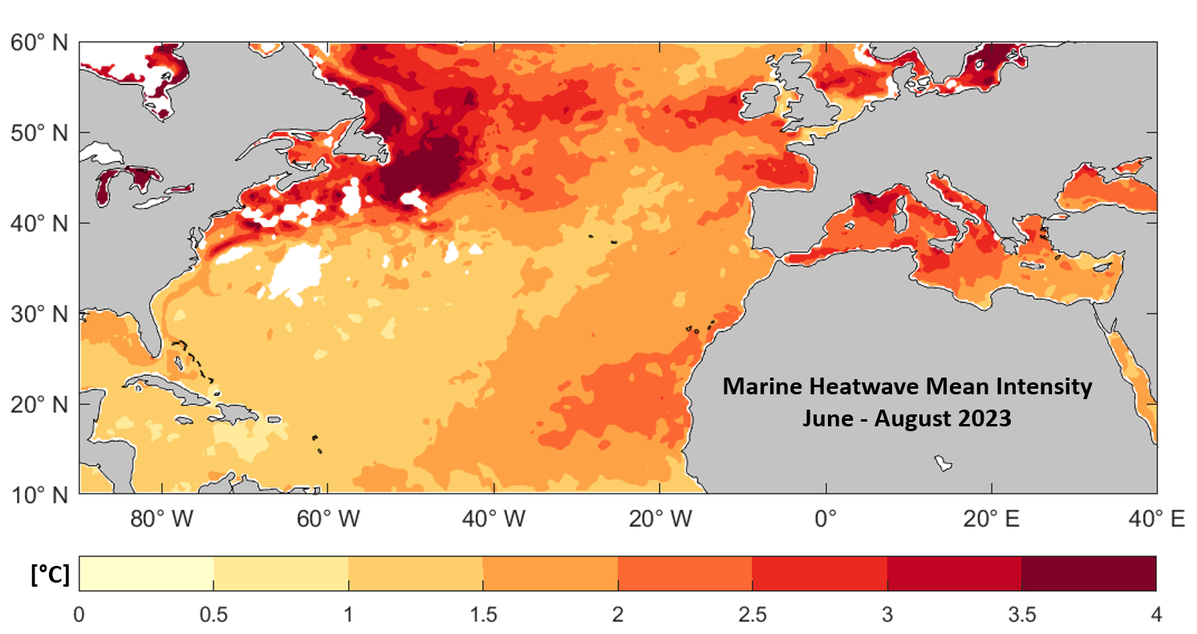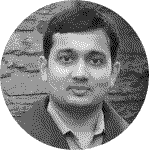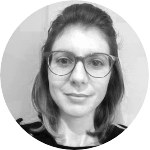News

14/02/2024 | On the future of agricultural diversity and sustainability: Dr. Irina Solovieva and Nadja Kasperczyk present a vision for diverse value chains in the organic sector
 |
The EU project BioValue 🌱 was actively represented by two ZEU colleagues at #BioFach2024, a global trade fair for organic food in Nuremberg, Germany. We are delighted to share with you the highlights of our recent session at BioFach 2024 entitled "New crops - new opportunities for the organic sector: a vision for diverse value chains". Our session focussed on the future of agricultural diversity and sustainability. The focus was on the results of BioValue, which were presented in two exciting keynote speeches:
🌾 From the perspective of the agricultural sector and value chains, we looked at the challenges and opportunities of greater crop diversity both in the fields and within the value chain itself.
👩🌾 From the consumer perspective, we presented our survey results, which show how a greater diversity of crops can arouse consumer interest and increase demand.
|
| In the moderated discussion that followed, participants' views on new crops and products were collected. This resulted in the following points:
🌱 Exploring optimal utilisation and recycling strategies for novel crops, paving the way for sustainable agricultural practices.
🌿 Identifying new crops that not only promote biodiversity in the fields, but also serve as pioneers for nature conservation.
🥦 Unveiling the potential of pulses such as chickpeas, beans and lentils, which were met with great enthusiasm and interest.
The full video recording of the event and detailed information on the session can be found in the BioFach congress programme at https://www.biofach.de/de-de/kongress-events
Are you curious to learn more about agrobiodiversity and the untapped potential of underutilised crops?
Visit the project website https://www.biovalue-project.eu/
|
|
02/02/2024 | Call for a Guest Professorship Position in "Sustainable Development Goal Interactions"
 |
The SDGNexus Network is pleased to announce an open call for a Guest Professorship Position in "Sustainable Development Goal Interactions." The position is available for six months, starting from July 1, 2024. An enthusiastic and experienced individual with citizenship of an ODA recipient country and a strong academic background in sustainable development is sought. The candidate should possess an excellent Ph.D., a proven track record of peer-reviewed publications, teaching experience, and relevant work experience in the SDGnexus Network's research areas in Central Asia or Latin America. The Guest Professor will be involved in research, contribute to our teaching programs, provide guidance to our early career scientists, and actively participate in the development of third-party funding proposals. For more information on the position and the application process, please refer the click here or visit the project website.
|
31/12/2023 | Jorge Gómez-Paredes left ZEU to Finland's Novia University of Applied Sciences
 |
After a very successful time as SDGNexus Network Guest Professor, the time has now come for Jorge Gómez-Paredes to take on a new professional challenge: From March 2024, he will join Finland's Novia University of Applied Sciences, as a researcher at the Faculty of Bioeconomy, to engage in team-leadership and research on a sustainable energy transition. During his time as a visiting guest professor, he established a new course entitled “Dealing with Complexity for Sustainability Transitions” in the lecture portfolio of faculty 09, Agricultural Sciences, Nutritional Sciences, and Environmental Management. Jorge also provided the SDGNexus Network with important research input in the areas of ecological economics and socio-ecological ethics. He was moreover successful with a third-party funding application to the DAAD program "International Virtual Academic Collaboration (IVAC)". With this funding, he had the opportunity to develop the “Dealing with Complexity for Sustainability Transitions” course further, in collaboration with researchers from the University of Sydney. In this context, professional short lecture videos were produced that will definitely improve the attractiveness and visibility of this course in the future. ZEU thanks him for his successful achievements during his time at JLU and wishes him all the best and continued success in his new position. |
30/11/2023 | New project initiated by Dr. Elena Xlopaki: Climate-Resilient Development Pathways in Metropolitan Regions of Europe (CARMINE)
The increasing frequency and intensity of climate and weather extremes associated with climate change challenge adaptation at local and regional levels. The implementation of the EU Strategy on Adaptation to Climate Change is fundamentally based on increasing the local resilience of the regions and communities, where enhanced modelling outputs can significantly/tangibly support local adaptation assessments and plans.
In this context, the project “Climate Resilient Development Pathways in Metropolitan Regions of Europe (CARMINE)” bridges the local and regional scales by providing impact-based decision support services and multi-level climate governance to support local adaptation, including both traditional and Nature-Based Solutions. CARMINE’s overarching goal is to help Europe’s metropolitan communities become more climate resilient by co-producing knowledge-based tools, strategies and plans for enhanced adaptation and mitigation actions in line with the Charter of the EU Mission on Adaptation to Climate Change by 2030.
To achieve this goal, focusing on the 2030-2035 timeframe and with longer perspectives up to 2050, CARMINE proposes an interdisciplinary approach aiming at
- co-creation and co-development of decision support services and guidelines for enhanced resilience and adaptive capacity, including early warning and disaster risk management systems;
- cooperating closely with local to regional communities (stakeholders and users), decision-, and policy-makers (local authorities) to co-develop cross-sectoral frameworks for adaptation and mitigation actions;
- delivering science-based R&I roadmaps for multi-level climate governance to support local adaptation assessments and plans.
The CARMINE methodology will be implemented in eight selected case study areas, including Prague (CZ), Leipzig (DE), Funen-Odense (DK), Athens (EL), Barcelona (ES), Bologna (IT), Brasiv (RO) and Birmingham (UK). To provide proof of concept, and the project methodology is demonstrated through the digital replication of the climatic and socio-economic characteristics of each area. CARMINE's co-created knowledge and transferable development pathways will be widely disseminated through project networks to drive adaptation in other European metropolitan regions and beyond.
Elena Xoplaki's working group will focus on the following tasks in the project:
- Integrating climate physical risk assessment models and earth system processes
- Evaluating socio-economic impacts of climate change and associated risks
- Co-developing Digital Twin simulations to enhance cross-sectoral climate resilience frameworks
15/11/2023 | New project to develop a pan-European early warning system against natural hazards
A new Horizon Europe project has been launched, in which ZEU, represented by Dr. Elena Xoplaki, is a member of the project consortium. The Mediterranean and Pan-European Forecast and Early Warning System against Natural Hazards, MedEWSa, kicked off at the premises of the Ministry of Digital Governance in Athens, Greece on 9-10 November 2023.
The Centre for International Development and Environmental Research (ZEU)'s "Climate and Environmental Change" focus area is thus once again expanding its research activities within this exciting topic.
The European and African countries adjacent to the Mediterranean basin are particularly exposed to natural hazards including extreme weather events. To enhance resilience and alleviate the impact of such hazards, coordinated preparedness and response mechanisms must extend beyond administrative and geographic regions.
This summer was the 5th warmest on record for Europe. Heatwaves sustained persistent dry conditions, facilitating the intensification and spread of wildfires in many regions. There were several significant flood events and localised flash flooding, such as those experienced in Greece, Lybia, Bulgaria and Turkey. In July local authorities in 16 Italian cities issued a red heat alert. The islands of Sicily and Sardinia saw maximum temperatures of 49 °C, a new record high.
The MedEWSa project (2023-2026), which has secured €5m of funding from Horizon Europe, develops a connected system of Multi-Hazard Early Warning Systems (MHEWS) that supports first responders and facilitates informed decision-making. In doing so, it directly contributes to the United Nations' Sustainable Development Goals and enhances the European Union's competitiveness and growth.
MedEWSa delivers a network of effective and interoperable MHEWS spanning across the Mediterranean basin and its adjacent countries. It builds on existing infrastructures, fills gaps, and harmonizes through innovative technologies. Particular attention is paid to current and emerging extreme event hotspots, vulnerable areas, and at-risk communities. Central to MedEWSa is a suite of carefully selected pairs of pilot sites, “twins”, that highlight discrepancies in coverage and capabilities and that foster collaboration and demonstrate the transferability of MedEWSa’s tools.
The main objectives of MedEWSa are
- Provide multi-hazard information and conduct risk analysis.
- Contribute to impact-based forecasting.
- Develop a fully integrated impact-based Multi-Hazard Early Warning System.
- Use AI-based decision-support solutions to enhance multi-hazard impact prediction.
- Develop innovative financial solutions through risk transfer to capital markets, including Insurance-Linked Securities and parametric insurance.
Elena and her team will contribute to building capacity against heatwaves, droughts and wildfires as well as floods with detection of these events in the sub-seasonal and seasonal scale. The partner is responsible for the preparation of the MedEWSa baseline of decision support systems, the post-processing of the model data, and the interdependent multi-hazards.
01/08/2023 | Dr. Seyedhamidreza Mojtabavi is the new postdoc researcher in the follow-up project NUKLEUS2
|
|
After successfully acquiring a follow-up project for NUKLEUS (NUKLEUS2), Muralidhar's successor has finally been found: with Dr. Hamid Mojtabavi, we were able to recruit an experienced postdoctoral researcher who had previously worked at the University of Bremen in an H2020 project. In his work package, he has developed a Python-based external package of the Open Global Glacier Model (OGGM) for the purpose of introducing a new parameterization of the impact of debris in a mass balance model on a global scale. For the new project, he will focus on data post-processing of high-resolution regional climate model simulations, implementing appropriate AI-based approaches for downscaling, analyzing and testing new techniques to assess the efficiency of methods for reproducing the distributional and temporal characteristics of extremes, and investigating potential risks associated with future changes in extremes. We wish him all the best for this! |
18/09/2023 | WMO report "United in Science 2023" recently published
"We stand at a pivotal point in history – the halfway mark for achieving the 2030 Agenda for Sustainable Development. With only 15% of the Sustainable Development Goals (SDGs) on
track, we are down at half-time and far from meeting global climate goals."
With these dramatic words begins the latest report of the World Meteorological Organization (WMO), which has compiled the latest climate science information from key global partner organizations focusing on weather, climate and water science and services for sustainable development. ZEU member Prof. Jürg Luterbacher was also involved in the report preparation under the leadership of the United Nations Secretary-General. The document can be downloaded here.
15/09/2023 | Dr. Aliya Assubayeva was awarded the JLU Early Career Researcher Grant for Water Security Study in South America
Dr. Aliya Assubayeva, a Research Associate at the Centre for International Development and Environmental Research at Justus Liebig University, has been selected as the recipient of the JLU Early Career Researcher Grant. This grant will support Dr. Assubayeva's research project aimed at unraveling the complexities of water security in the Mira-Mataje transboundary catchment in South America.
Water security has emerged as a critical global issue, impacted by climate change, population growth, urbanization, and pollution. Dr. Assubayeva's research seeks to address this challenge focusing on the community and transboundary scales, particularly in South America. The project centers on the Mira and Mataje rivers, vital watercourses shared by Colombia and Ecuador, and aims to amplify the voices of indigenous and afro-descendant communities whose perspectives have been historically overlooked in water policy and management.
This research employs qualitative research methods, including a comprehensive literature review, a Delphi survey involving water users and stakeholders, and semi-structured interviews with local communities in Ecuador. Field data collection will play a pivotal role in understanding the on-the-ground water security issues in the catchment. Reflecting on her previous research in Central Asia, Dr. Assubayeva notes that this comparative study will contribute to the global discourse on water security.
Collaborating with colleagues from the SDGnexus Network Dr. Alicia Correa and Dr. Jorge Forero, both distinguished researchers in their respective fields, along with Dr. Stefanos Xenarios, a Principal Research Scientist at the Commonwealth Scientific and Industrial Research Organisation in Australia, this interdisciplinary team is poised to generate valuable insights and solutions.
The JLU Early Career Researcher Grant, offered by Justus Liebig University, provides critical support for early career researchers to undertake independent and impactful research projects. These endeavors are expected to culminate in scientific publications or corresponding research outputs, advancing the realms of science communication and open science.
For more information about the JLU Early Career Researcher Grant, please visit: https://www.uni-giessen.de/en/research/research-funding/internalresfolder/jlu-early-career-researcher-grant#
09/08/2023 | ZEU member Prof. Jürg Luterbacher has been appointed to the new UN Scientific Advisory Board in his capacity as Director of the WMO Department of Science and Innovation.
|
|
|
The United Nations Secretary-General António Guterres announced on 3 August the creation of a new Scientific Advisory Board to advise UN leaders on breakthroughs in science and technology and how to harness the benefits of these advances and mitigate potential risks. “Scientific and technological progress can support efforts to achieve the Sustainable Development Goals – but they are also giving rise to ethical, legal and political concerns that require multilateral solutions.” Mr. Guterres said. The Advisory Board will comprise seven eminent scholars alongside the Chief Scientists of UN System entities, the Secretary-General’s Envoy on Technology, and the Rector of the United Nations University. The Board will be associated with a network of diverse scientific institutions from across the world. Chief scientists from several UN organizations have been nominated to participate in this Scientific Advisory Board. Prof. Juerg Luterbacher, Director of the WMO Department of Science and Innovation and member of the ZEU, is representing the World Meteorological Organization. Seven external academic experts from universities around the world are also joining this board, together with the rector of United Nations University, and the Secretary-General’s Envoy on Technology. "Science-based policy as well as decision-making are key for progress and sustainable development in our rapidly evolving world and to leave none behind” said Prof. Juerg Luterbacher, Chief Scientist of WMO. Source: WMO
|
06/08/2023 | WMO confirms July 2023 as the hottest month on record
|
Lorine Behr gave an interview to the Süddeutsche Zeitung about the current marine heatwave in the North Atlantic and the Mediterranean Sea. |
|
|---|---|
|
(C) Lorine Behr Article "Hitzewellen im Meer-Das hat für diesen Sommer niemand vorhergesagt", SZ vom 4.8.2023 (behind paywall) |
The article discusses the excessive ocean temperatures in the North Atlantic and Mediterranean Sea observed this year, especially in June and July. Globally, the surface temperature of the oceans in the mid-latitudes was 20.96 °C at the end of July, according to data from the EU's Copernicus climate service. This replaces the previous record of 20.95 °C set in 2016. It is interesting to note that these (marine) heatwaves are occurring everywhere at the same time this summer, or being one major heat wave e. g. in the North Atlantic. Reasons for that might be climate change, the current evolving El Niño in the South Pacific, the position of the jet stream or internal variability, like the Atlantic Multidecadal Oscillation, which is in its warmer phase in recent years. Also, the Western Mediterranean Sea was hit by a strong record-breaking marine heatwave in June, moving to the Eastern Mediterranean in July and August. In some areas like the Alboran Sea, this marine heatwave has been observed since March and was likely coupled to the strong heatwave in the eastern North Atlantic. However, the heat in the North Atlantic alone cannot explain this spread to the Eastern Mediterranean. Both, the ocean and the atmosphere, play a role in the most intense marine heatwaves. |
|
The Mediterranean region experienced repeated “Omega” or “Heat Dome” weather conditions in June and July, with hardly any rain or clouds, high solar radiation and warming of the air and sea surface temperature. (Marine) heatwaves have been occurring more frequently in the Mediterranean, are more intense and last longer than before. These are global phenomena, but the Mediterranean region is among the worst affected. This has an impact on the flora and fauna of the Mediterranean and other places: Many sponge and seagrass species cannot tolerate the high temperatures and die. Fish migrate to cooler environments, which in turn has an impact on the economy. Sombrero Reef in the Florida Keys observed 100% coral mortality at 38 °C water temperature. On the other hand, jellyfish and other invasive species thrive in these high temperatures and are likely to be found more frequently on European beaches. By then, at the latest, inhabitants and tourists will realize that something is seriously wrong in the ocean. read the WMO news item |
|
24/07/2023 | Dr. Iskandar Abdullaev joins SDGnexus Network as a Guest Professor based at Justus Liebig University in Giessen, Germany
The SDGnexus Network has appointed Dr. Iskandar Abdullaev, a renowned water management expert on Central Asia, as a Guest Professor at Justus Liebig University Giessen, Germany. He has actually joined our team for 12 months. The SDGnexus Network is a global community of universities, research centres, and stakeholders in Europe, Central Asia, and Latin America committed to promoting the 2030 Agenda for sustainable development.
 |
Dr. Abdullaev brings a wealth of experience and expertise to his new role. Holding an MSc degree in Hydrotechnical Engineering and a Ph.D. degree in Water Management, both from the Tashkent Institute of Irrigation and Agriculture Mechanization Engineers – National Research University (TIIAME-NRU) in Uzbekistan, he has spent over 25 years working in water management and environmental activities across Afghanistan and five Central Asian countries. His academic journey has taken him around the globe, including conducting part of his Ph.D. work at Iowa State University in the United States and undergoing intensive training and education programs in Israel, the Netherlands, and Switzerland. Dr. Abdullaev has made significant contributions to the field through his research and publications, with three monographic books, over 30 peer-reviewed articles, policy papers, and more than 150 conference presentations. Prior to his appointment at Justus Liebig University, Dr. Abdullaev served as the Deputy Director for Research, Capacity Building, and Knowledge Management at the Central Asia Regional Economic Cooperation (CAREC) Institute from 2019 to 2023. Before that, he worked as the Executive Director of the Regional Environmental Center (CAREC) for Central Asia from 2013 to 2019 and as a Regional Advisor for Germany's Berlin Initiative-Transboundary Water Management in Central Asia at the German Society for International Cooperation (GIZ) from 2009 to 2013. Throughout his career, Dr. Abdullaev has been actively involved in research collaborations and scientific societies worldwide. He is a member of the International Water Resources Association (IWRA) and serves on the editorial boards of several internationally peer-reviewed journals. As a Guest Professor at Justus Liebig University Giessen, Dr. Abdullaev will combine his research expertise with teaching responsibilities, engaging with students and scholars to foster knowledge exchange and contribute to the advancement of sustainable development. His work will focus on critical topics such as financing water infrastructure, water institutions, and environmental activities, aligning with the SDGnexusNetwork's commitment to addressing the challenges outlined in the United Nations SDGs. |
12/07/2023 | Call for Applications 2024: Planetary Scholars & Artists in Residence Program – Planetary Times
On behalf of the Panel on Planetary Thinking, we are pleased to announce the third round of our Fellowship Program - this time with a thematic focus on "Planetary Times."
The necessary information to apply can be found here.
The application deadline for this third round is September 1, 2023.
05/06/2023 | Environmental sustainability in basic research - A perspective from HECAP+
On World Environment Day, 5th June 2023, a document produced by a grassroots initiative of scientists from the basic research disciplines of High Energy Physics, Cosmology, Astroparticle Physics, and Hadron and Nuclear Physics was released. The aim of this document is to reflect on the environmental impacts of these communities’ research and work practices, to highlight current efforts and best practices, and to make concrete recommendations for positive changes. Basic outcomes of this paper go beyond the field of the authors to all fields of research.
The document can be accessed at our website https://sustainable-hecap-plus.github.io/
A pdf version is here: https://sustainable-hecap-plus.github.io/Sustainability_in_HECAPplus.pdf
The motivation of all this work is as stated in the first sentence of the abstract: “The climate crisis and the degradation of the world’s ecosystems require humanity to take immediate action.”
The focus for each section of the paper is and has always been on best practices, solutions, and improvements – ways that things can be done better instead of simply bemoaning in a doom and gloom way the inevitability of impending further climate chaos.
Even reading just the Forewords, one will see that multiple leaders in our fields, representing a wide diversity of research disciplines, consider climate change a profound concern for not only physics research, but for humanity as a whole. They are eloquent in explaining the importance of considering GHG-emission factors in each step of our research lives.
We look forward to hearing about more initiatives along these lines, and implementation of some of the recommendations from any and all HECAP+ scientists.
And, we note here also that every single bit of this work was done remotely through Zoom and other tools, so that almost none of us have met in person ever. Despite this a number of us have become well-connected, and even friends, through the process. We thus would like to say we are an example of how well collaboration can actually work remotely and with little environmental impact.
Thank you – from HECAP+ and future generations – in advance, for whatever part of this document that you read, and act on.
03/06/2023 | Muralidhar Adakudlu moves to Norwegian Meteorological Institute
|
|
|
With the completion of the first part of the Nutzbare Lokale Klimainformationen für Deutschland (NUKLEUS) project at the end of May, Muralidhar Adakudlu did not extend his contract, but returned to his family in Norway. We thank him very much for the valuable and friendly project work and wish him all the best for his professional future at the Norwegian Meteorological Institute. |
02/06/2023 | Water Security and Climate Change Conference (WSCC23) - Call for Abstracts
Join us at the Water Security and Climate Change (WSCC) Conference in Cuenca, Ecuador from 21.11 - 23.11.2023. The WSCC is an annual event where scientists, policy makers, and stakeholders from various sectors discuss the diverse facets of water security and its relationship to climate variability and climate change.
21.11.2023 09:00 bis 23.11.2023 18:00 (Europe/Berlin / UTC100)
Cuenca, Ecuador
The Water Security and Climate Change Conference (WSCC) is thrilled to announce that the abstract submission process is now open!
Join us at the Universidad de Cuenca, Ecuador on 21 – 23 of November 2023 to share your research and insights with experts from around the world.
This year's conference theme, Coping with extremes: Impacts & Innovation for Adaption, will delve into the latest advancements, challenges, and opportunities in diverse facets of water security and its relationship to climate variability and climate change. We invite abstract submissions related to one of the conference themes:
1) Water and Climate: Challenges, Opportunities, and Innovative Solutions
2) Water & Climate Resilience in Agri-Food Systems
3) Water Security: Science-Policy-Society Dialogue (Priorities & Implementation)
Don't miss this opportunity to present your findings, engage in dynamic discussions, and expand your professional network. Submit your abstract now and be a part of the WSCC23!
🗓️ Abstract Submission Deadline: 31 July 2023
🔗 Abstract submission guidelines: https://watersecurity.info/2023-submission/
🌐 Learn more about WSCC23: https://watersecurity.info/
📧 For inquiries, contact at wscc_2023@ucuenca.edu.ec
The conference is supported by the German Academic Exchange Service (DAAD Deutscher Akademischer Austauschdienst) from funds of the Federal Ministry for Economic Cooperation (Bundesministerium für wirtschaftliche Zusammenarbeit und Entwicklung (BMZ)).

About Water Security and Climate Change Conference
The SDGnexus Network, the Centers for Natural Resources and Development (CNRD), the International Network on Sustainable Water Management in Developing Countries (SWINDON), the Food Security Center (FSC) and the Asian Institute of Technology (AIT) are pleased to invite the community of renowned water and climate change experts to propose abstracts for the Water Security and Climate Change Conference (WSCC), 21 - 23 November 2023 in Cuenca, Ecuador.
Achieving water security under climate change conditions is one of the major challenges faced by society today – both globally and locally. By building bridges between disciplines, sectors and different stakeholders, the conference provides a platform for international exchange. Consequently, interdisciplinary links are revealed and synergies between scientific evidence and societal and political decisions are released. The conference thus contributes to the formulation of sustainable strategies for water resource management in the face of climate change.
The WSCC 2023 is supported by the Exceed program (Higher Education Excellence in Development Cooperation) and follows a successful series of conferences implemented in Thailand, Germany, Kenya, Mexico, Vietnam, and Thailand between 2016 and 2022.
22/03/2023 | New project on the starting blocks: Virtual academic collaboration between Justus Liebig University Gießen and the University of Sydney
Jorge Gomez-Paredes. PhD and Prof. Ramona Teuber have successfully received DAAD funding to establish a virtual academic collaboration between the Universities of Sydney and Giessen, which will enable intercultural and academic exchange between faculty and students from Germany and Australia in the academic field of sustainable development.
15/03/2023 | Yanet Diáz (PhD) is the new member of the DAKI-FWS team holding a postdoctoral position in AI/ML and Climate Extremes
|
|
Yanet previously worked as a researcher at the Universidad Nacional Autonoma de Mexico (UNAM-Mexico). Her research there included climate variability and synoptic climatology. A particular focus has been the influence of large-scale atmospheric patterns on weather phenomena and environmental conditions Environmental conditions at local scales. Accordingly, her main research interests include the projection of risks associated with extreme hydro-meteorological events for various of climate warming, and the assessment of the impacts of warming-related extreme events on natural and built environments. |






